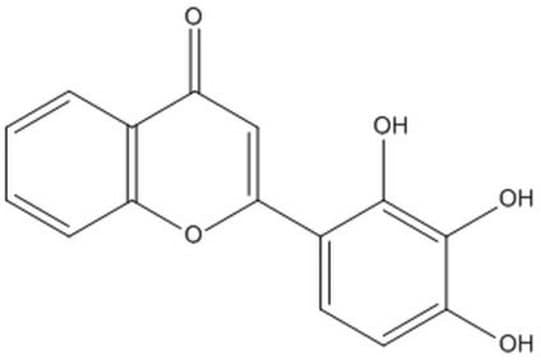5.08197
Ginkgolic Acid (15:1)
InSolution, ≥98%, 25 mM in DMSO
Synonym(s):
InSolution Ginkgolic Acid (15:1), Histone Acetyltransferase Inhibitor VI, PCAF Inhibitor II, HAT Inhibitor VI, SUMOylation Inhibitor, ( Z)-6-(Pentadec-8-enyl)-2-hydroxybenzoic acid, ( Z)-2-Hydroxy-6-(pentadec-8-enyl)benzoic acid, Histone Acetyltransferase Inhibitor VI, PCAF Inhibitor II, HAT Inhibitor VI, SUMOylation Inhibitor, (Z)-6-(Pentadec-8-enyl)-2-hydroxybenzoic acid, (Z)-2-Hydroxy-6-(pentadec-8-enyl)benzoic acid
About This Item
Recommended Products
Quality Level
Assay
≥98% (HPLC)
form
liquid
manufacturer/tradename
Calbiochem®
storage condition
OK to freeze
avoid repeated freeze/thaw cycles
desiccated (hygroscopic)
protect from light
storage temp.
−70°C
InChI
1S/C22H34O3/c1-2-3-4-5-6-7-8-9-10-11-12-13-14-16-19-17-15-18-20(23)21(19)22(24)25/h7-8,15,17-18,23H,2-6,9-14,16H2,1H3,(H,24,25)/b8-7-
InChI key
YXHVCZZLWZYHSA-FPLPWBNLSA-N
General description
Biochem/physiol Actions
SUMO-activating enzyme E1
Packaging
Warning
Physical form
Reconstitution
Other Notes
Legal Information
Storage Class Code
10 - Combustible liquids
WGK
WGK 2
Flash Point(F)
188.6 °F - (refers to pure substance)
Flash Point(C)
87 °C - (refers to pure substance)
Certificates of Analysis (COA)
Search for Certificates of Analysis (COA) by entering the products Lot/Batch Number. Lot and Batch Numbers can be found on a product’s label following the words ‘Lot’ or ‘Batch’.
Already Own This Product?
Find documentation for the products that you have recently purchased in the Document Library.
Related Content
Select different protease inhibitor types based on your needs to prevent protein degradation during isolation and characterization and safeguard proteins in sample prep.
Select different protease inhibitor types based on your needs to prevent protein degradation during isolation and characterization and safeguard proteins in sample prep.
Select different protease inhibitor types based on your needs to prevent protein degradation during isolation and characterization and safeguard proteins in sample prep.
Select different protease inhibitor types based on your needs to prevent protein degradation during isolation and characterization and safeguard proteins in sample prep.
Our team of scientists has experience in all areas of research including Life Science, Material Science, Chemical Synthesis, Chromatography, Analytical and many others.
Contact Technical Service







